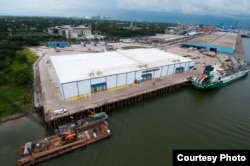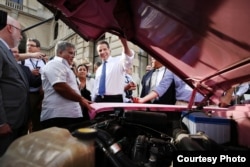Agriculture experts say U.S. farm exports to Cuba could more than triple in the next five years - reaching $1 billion - and support thousands of new U.S. jobs.
Farmers and government officials told the U.S. Senate Finance Committee recently, however, that both Washington and Havana must remove more legal, logistical, and financial obstacles to reach this goal.
President Barack Obama recently eased restrictions on trade and travel to Cuba and allowed Cuban-Americans to send larger amounts of money to their families on the communist-ruled island. But Obama can’t end the decades-old trade embargo against Cuba without congressional approval.
Major resistance
There is strong opposition to ending the embargo or taking other steps to ease restrictions from some Cuban-American members of Congress who call such steps “appeasement” of dictators and a threat to U.S. security.
They argue that expanded trade would support a hostile authoritarian government far more than it helps Cuban consumers.
New York University Center for Global Affairs’ Arturo Lopez-Levy, disagrees with these critics, but he said it may take several years to fully normalize relations between the former Cold War adversaries.
Cuba could be a much larger business opportunity for U.S. farm products because the island imports about 80 percent of the food consumed by its 11 million people, according to Michael Scuse of the U.S. Agriculture Department.
Scuse and other witnesses said Cuba buys food from distant lands like Vietnam, New Zealand, the European Union, Canada, Brazil, and Argentina. That rice, wheat, corn, milk, and fruit is available from the United States with lower shipping costs, giving Cuban consumers a price break, and leaving more room for farmers to profit.
Enabling smaller companies
U.S. farmers have been selling food to Cuba for a few years, after an earlier partial easing of the trade embargo, but they complain they are losing business to other nations because current U.S. law blocks the kind of marketing and financing their rivals use to sell more goods.
Minnesota cattle rancher Ralph Kaehler said large companies may have the resources to prosper without help from the U.S. Agriculture Department, but small companies like his do not.
Farmer Doug Keesling, whose family has been raising wheat in Kansas for five generations, said the current U.S. “rules and laws” complicate financing and make it “too expensive” to compete for business in Cuba.
These farmers and other experts also complain the Cuban government requires U.S. goods to go through its “Alimport” organization, needlessly complicating and slowing down such transactions.
Some business, though, is already underway. Officials at the U.S. port of New Orleans say they ship 25,000 tons of frozen chicken from American producers to Cuba each year, and are “optimistic” the trade will grow in volume and variety.
Making progress
Matt Gresham said New Orleans was one of the island’s largest trading partners prior to the embargo, and could eventually regain that status.
He said the Cuban people will likely need farm products, machinery and many other goods, but he expects it will take a while for the island’s economy to expand enough to create additional buying power.
That growth may be helped by Obama's policy changes that loosen restrictions on financial transactions with Cuba, and raise the limit on remittances.
Harvard University's Manuel Orozco writes these changes will allow more Cuban businesses to offer electronic transactions, boost competition for financial services, and increase disposable income for many Cubans. Taken together, these changes will boost purchasing power, savings and investment. That will help expand the island's small private sector.
New York’s Andrew Cuomo is not waiting for political, legal, or economic progress. He's leading a trade delegation to Cuba this week. That makes him the first governor of a U.S. state to head such a mission since Obama eased restrictions.
Cuomo said he would like to sell New York’s apples to Cuba, and New York businesses have just made deals for a cancer research project with Cuban colleagues, and for computer software sales on the island.














